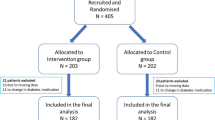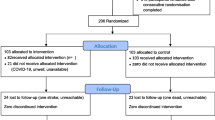Abstract
Background
Community health workers are community members who provide education and care for patients for a broad range of health issues, including diabetes mellitus. However, few community health workers are trained for diabetes education and little is known about the effectiveness of their interventions. The aim of this study is to evaluate the effect of a diabetes education program delivered to community health workers in improving the metabolic control of patients with type 2 diabetes mellitus.
Methods
Eight community health workers, providing care for 118 patients, were randomized in two groups to receive a 1-month diabetes education program (intervention, patients n = 62) or an education course in other health issues (control, patients n = 56). Each community health worker was responsible for transmitting the acquired knowledge to patients. Primary outcome was changed in HbA1C 3 months after the intervention.
Results: participants
Mean age was 61 ± 11 years, 35% were men and 62% were whites. HbA1c levels reduced in both groups (intervention: 9.1 ± 2.2 vs. 7.9 ± 1.9%; control: 9.1 ± 2.1 vs. 8.4 ± 2.5%, p < 0.001), but no statistically significant differences were observed between groups (p between groups = 0.13). Total cholesterol (intervention: 192 ± 43 vs. 182 ± 39 mg/dl; control: 197 ± 44 vs. 191 ± 45 mg/dl, p between groups = 0.035) and triglycerides (intervention: 158 [106–218] vs. 135 [106–215]; control: 128 [100–215] mg/dl vs. 146 [102–203] mg/dl, p between groups = 0.03) reduced overtime only in intervention group.
Conclusions
In this study, a significant decrease in HbA1c was observed during patients' follow-up, but it was similar in intervention and control groups. The diabetes mellitus education course delivered to community health workers was able to improve patients’ lipid profile.
Similar content being viewed by others
References
IDF Diabetes Atlas, http://www.idf.org/diabetesatlas. Accessed April 2015
American Diabetes Association, Standards of medical care in diabetes–2016. Diabetes Care 39(1), S1–112 (2016)
American Association of Diabetes Educators Community Health Workers in Diabetes Management and Prevention, American Association of Diabetes Educators (AADE) Position Paper, 2011
M. Viswanathan, J. Kraschnewski, B. Nishikawa, L. Morgan, P. Thieda, A. Honeycutt, K. Lohr, D. Jonas, Outcomes of Community Health Worker Interventions. Evidence Report/Technology Assessment No. 181. AHRQ Publication No. 09-E014. Rockville MD; (2009)
M.A. Look, N.K. Baumhofer, J. Ng-Osorio, J.K. Furubayashi, C. Kimata, Diabetes training of community health workers serving native hawaiians and pacific people. Diabetes Educ. 34, 834–840 (2008)
M.A. Powers, J. Bardsley, M. Cypress, P. Duker, M.M. Funnell, A.H. Fischl, M.D. Maryniuk, L. Siminerio, E. Vivian, Diabetes self-management education and support in type 2 diabetes: a joint position statement of the American diabetes association, the American association of diabetes educators, and the academy of nutrition and dietetics. Diabetes Care 38(7), 1372–1382 (2015)
S. Lewin, S. Munabi-Babigumira, C. Glenton, K. Daniels, X. Bosch-Capblanch, B.E. Van Wyk, J. Odgaard-Jensen, M. Johansen, G.N. Aja, M. Zwarenstein, I.B. Scheel, Lay health workers in primary and community health care for maternal and child health and the management of infectious diseases. Cochrane Database Syst. Rev. 11, CD004015 (2010). doi:10.1002/14651858.
Brasil. Ministério da Saúde. Secretaria de Atenção à Saúde. Departamento de Atenção Básica. Política nacional de atenção básica / Ministério da Saúde, Secretaria de Atenção à Saúde, Departamento de Atenção à Saúde. – Brasília: Ministério da Saúde (2006)
J.J. Gagliardino, G. Etchegoyen, A model educational program for people with type 2 diabetes: a cooperative Latin American implementation study (PEDNID-LA). Diabetes Care 24(6), 1001–1007 (2001)
S.F. Scain, R. Friedman, J.L. Gross, A structured educational program improves metabolic control in patients with type 2 diabetes: a randomized controlled trial. Diabetes Educ. 35(4), 603–611 (2009)
C.C. Gross, S.F. Scain, R. Scheffel, J.L. Gross, C.S. Hutz, Brazilian version of the problem areas in diabetes scale (B-PAID): validation and identification of individuals at high risk for emotional distress. Diabetes Res. Clin. Pract. 76(3), 455–459 (2007)
C.M.M. Cordova, C.R. Schneider, I.D. Juttel, M.M. Cordova, Avaliação da dosagem direta do colesterol-LDL em amostras de sangue de 10.664 pacientes em comparação com o uso da fórmula de Friedewald. Arq. Bras. Cardiol. 83(6), 476–481 (2004)
M.S. Spencer, A.M. Rosland, E.C. Kieffer, B.R. Sinco, M. Valerio, G. Palmisano, M. Anderson, J.R. Guzman, M. Heisler, Effectiveness of a community health worker intervention among African American and Latino adults with type 2 diabetes: a randomized controlled trial. Am. J. Public Health 101(12), 2253–2260 (2011)
T.L. Gary, L.R. Bone, M.N. Hill, D.M. Levine, M. McGuire, C. Saudek, F.L. Brancati, A randomized controlled trial of the effects of nurse case manager and community health worker interventions on risk factors for diabetes-related complications in urban African Americans. Prev. Med. 37, 23–32 (2003)
J.S. Holtrop, J. Hickner, S. Dosh, M. Noel, T.L. Ettenhofer, ‘Sticking to it—diabetes mellitus’: a pilot study of an innovative behavior change program for women with type 2 diabetes. J. Health Educ. 33, 161–166 (2002)
R. Pérez-Escamilla, G. Damio, J. Chhabra, M.L. Fernandez, S. Segura-Pérez, S. Vega-López, G. Kollannor-Samuel, M. Calle, F.M. Shebl, D. D’Agostino, Impact of a community health workers–led structured program on blood glucose control among latinos with type 2 diabetes: the DIALBEST trial. Diabetes Care 38(2), 197–205 (2015)
A. Steinsbekk, L.O. Rygg, M. Lisulo, M.B. Rise, A. Fretheim, Group based diabetes self-management education compared to routine treatment for people with type 2 diabetes mellitus. A systematic review with meta-analysis. BMC Health Serv. Res. 12, 213 (2012)
J.K. Tshiananga, S. Kocher, C. Weber, K. Erny-Albrecht, K. Berndt, K. Neeser, The effect of nurse-led diabetes self-management education on glycosylated hemoglobin and cardiovascular risk factors: a meta-analysis. Diabetes Educ. 38, 108–123 (2012)
L.I. Faruque, N. Wiebe, A. Ehteshami-Afshar, Y. Liu, N. Dianati-Maleki, B.R. Hemmelgarn, B.J. Manns, M. Tonelli, Effect of telemedicine on glycated hemoglobin in diabetes: a systematic review and meta-analysis of randomized trials. CMAJ 189(9), E341–E364 (2017)
G. Welch, S.E. Zagarins, R.G. Feinberg, J.L. Garb, Motivational interviewing delivered by diabetes educators: does it improve blood glucose control among poorly controlled type 2 diabetes patients? Diabetes Res. Clin. Pract. 91, 54–60 (2011)
T.S. Tang, M.M. Funnell, M. Oh, Lasting effects of a 2-year diabetes self-management support intervention: outcomes at 1-year follow-up. Prev. Chronic Dis. 9, E109 (2012)
C.K.H. Wong, W.C.W. Wong, E.Y.F. Wan, A.K.C. Chan, F.W.K. Chan, C.L.K. Lam, Macrovascular and microvascular disease in obese patients with type 2 diabetes attending structured diabetes education program: a population-based propensity-matched cohort analysis of patient empowerment programme (PEP). Endocrine 53, 412 (2016)
C.K.H. Wong, W.C.W. Wong, Y.F. Wan, A.K.C. Chan, K.L. Chung, F.W.K. Chan, C.L.K. Lam, Patient empowerment programme in primary care reduced all-cause mortality and cardiovascular diseases in patients with type 2 diabetes mellitus: a population-based propensity-matched cohort study. Diabetes Obes. Metab. 17(2), 128–135 (2015)
S.L. Norris, F.M. Chowdhury, K. Van Le, T. Horsley, J.N. Brownstein, X. Zhang, L.Jr Jack, D.W. Satterfield, Effectiveness of community health workers in the care of persons with diabetes. Diabet. Med. 23, 544–556 (2006)
C. Gazzaruso, M. Fodaro, A. Coppola, Structured therapeutic education in diabetes: is it time to re-write the chapter on the prevention of diabetic complications? Endocrine 53, 347 (2016)
S.L. Norris, J. Lau, S.J. Smith, C.H. Schmid, M.M. Engelgau, Self-management education for adults with type 2 diabetes: a meta-analysis of the effect on glycemic control. Diabetes Care 25, 1159–1171 (2002)
X. He, J. Li, B. Wang, Q. Yao, L. Li, R. Song, X. Shi, J.A. Zhang, Diabetes self-management education reduces risk of all-cause mortality in type 2 diabetes patients: a systematic review and meta-analysis. Endocrine 55, 712 (2017)
M.T. Schram, C.A. Baan, F. Pouwer, Depression and quality of life in patients with diabetes: a systematic review from the European depression in diabetes (EDID) research consortium. Curr. Diabetes Rev. 5(2), 112–119 (2009)
C. Lloyd, J. Smith, K. Weinger, Stress and diabetes: a review of the links. Diabetes Spectr. 18(2), 121–127 (2005)
G.A. Nichols, T.A. Hillier, K. Javor, J.B. Brown, Predictors of glycemic control in insulin-using adults with type 2 diabetes. Diabetes Care 23, 273–277 (2000)
Acknowledgements
The authors gratefully acknowledge the support of the collaborating organizations: CNPq and Fundo de Incentivo à Pesquisa (FIPE). C.B.L. and J.L.G. were recipients of a scholarship from CNPq. The Authors are also grateful to the health care professionals and patients of the primary care unit São Pedro and to Hospital de Clínicas de Porto Alegre, Porto Alegre, Rio Grande do Sul, Brazil, for their support in the conduction of this research. This study was partially sponsored by FIPE of Hospital de Clínicas de Porto Alegre.
Author information
Authors and Affiliations
Corresponding author
Ethics declarations
Conflict of interest
The authors declare that they have no competing interests.
Rights and permissions
About this article
Cite this article
de Souza, C.F., Dalzochio, M.B., Zucatti, A.T.N. et al. Efficacy of an education course delivered to community health workers in diabetes control: A randomized clinical trial. Endocrine 57, 280–286 (2017). https://doi.org/10.1007/s12020-017-1352-z
Received:
Accepted:
Published:
Issue Date:
DOI: https://doi.org/10.1007/s12020-017-1352-z




